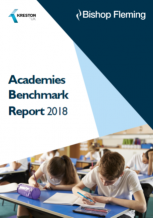With more than 200 members in our Academy team, we've got the capacity and expertise to meet your needs.
New Academies Financial Handbook
28th June 2018
The new Academies Financial Handbook (AFH) has been released by the ESFA. It takes effect from 1 September 2018 for the new school year, but you should be aware of the changes and guidance immediately as you may need to take early action in advance of this date to ensure compliance.
All of the key changes are detailed on page 6 and 7 of the AFH, but the key changes we would draw your attention to include:
Governance – section 1.3.1-1.3.5
There is greater emphasis on Trustees applying high standards of governance, the role of the chair, working with the ESFA and updated details re church academies. This includes the core functions of governance including:
- Ensuring clarity of vision, ethos and strategic direction
- Holding executive leaders to account for the educational performance of the organisation and its pupils, and the performance and management of staff
- Overseeing and ensuring effective financial performance
The term “ex-officio” has been removed to avoid suggesting an Trust’s senior executive leader is automatically a Trustee (1.5.1).
Section 2.1.2 explains that board meetings MUST be at least 3 times a year and larger trusts should consider meeting more regularly. New this year however is a MUST that if a Trust meets less than six times a year, it MUST describe in the annual accounts via the governance statement, how the board has maintained effective oversight of the funds with fewer meetings. If the board currently meets less than 6 times a year, now would be a good opportunity to review this ahead of next year.
Financial planning and monitoring has been strengthened and the reporting requirements on a monthly basis have been made more comprehensive. In particular, section 2.3.3 states that management reports MUST be prepared every month, setting out financial performance and position. They MUST include:
- Budget variance reports
- Cash flow forecasts with sufficient information to manage cash, debtors and creditors
These management accounts MUST be shared with the Chair of Trustees every month, and with other trustees at least 6 times a year. The board MUST consider these when they meet.
It is also clear that the trust MUST select key financial performance indicators and measure performance against these regularly (and in the trustees report in the financial statements). Whilst it is not a MUST, we would recommend that these KPI’s are incorporated into your month end reporting packs. A good starting point for your KPIs will be the Top 10 checks for governors as published by the ESFA.
In regards to Executive Pay the guidance (2.4.4 – 2.4.5) has been expanded to include guidance that senior executive pay should be proportionate – and that it would be defensible relative to the public sector market. There is also a basic presumption that non-teaching pay should not increase at a faster rate than that of teachers, in individual years and over the longer term.
There are some new rules for related party transactions. This is a key change and is already being reported in the press. In particular, for any transactions with related parties entered into on or after 1 April 2019, you MUST report these transactions in advance of the transactions taking place via the ESFA’s online form (3.10.4 – 3.10.7).
For contracts exceeding £20,000, a transaction that takes the total value of contracts with a related party over £20,000 for the financial year, or any contract where there have already been transactions totalling £20,000 in year, ESFA approval MUST be sought in advance of the transaction occurring.
The key to ensuring compliance with the new rules is to ensure that all related parties are accurately identified and reported, such that any transactions are highlighted and action can be taken at the right time.
Whilst not a new requirement, there is more clarity added to the handbook and in particular it makes it clear that trusts should consider the requirements of the novel, contentious and/or repercussive rules in light of related party transactions, especially relevant when there are transactions involving the chair and the accounting officer.
There is clarity also provided around Diocese schools. In section 3.10.20 is clarifies that contributions made by a trust to its Diocese for services associated with securing the trust’s religious character and ethos, which only the diocese can provide, are regarded as meeting the at cost principal. Diocese trusts will still need to be careful however around other services that your diocese sponsor may provide, such as building and estates management. These transactions could well fall within the “at cost” rules and so will need to be reviewed for both the at cost rules and prior ESFA approval.
As previously highlighted in the sector, there is clarity (4.8.4) over what the ESFA will do if trusts do not comply with requirements for submitting financial information. As previously reported the ESFA will publicise the names of late returners. There is also a new statement that if submissions are received late, or are not of sufficient quality, then the ESFA may conduct investigations to collect the data and may deduct the costs of these investigations from the trust’s recurrent funding.
The final change that we would make boards especially aware of, is that Annex C, the “musts”, includes a top 10 “musts” for chairs and other trustees. This includes a requirement that the board MUST ensure there is an appropriate, reasonable and timely response to any findings by auditors. This will usually be achieved through responding to recommendations made in the auditors’ management letter. We would also recommend that this top 10 list is presented to the board at your next board meeting to ensure that the board are aware of their key responsibilities.





